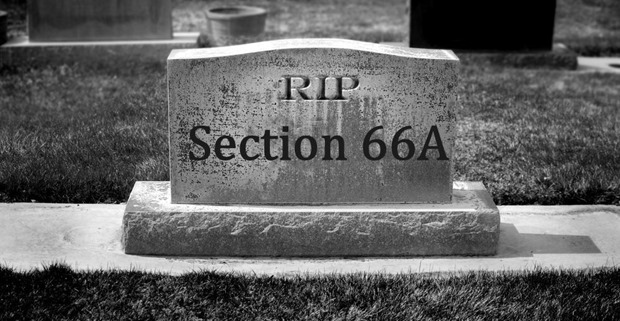
According to the Section 66A of the Information Technology Act, 2000:
Punishment for sending offensive messages through communication service, etc.
66A. Any person who sends, by means of a computer resource or a communication device,-
(a) any information that is grossly offensive or has menacing character; or
(b) any information which he knows to be false, but for the purpose of causing annoyance, inconvenience, danger, obstruction, insult, injury, criminal intimidation, enmity, hatred or ill will, persistently by making use of such computer resource or a communication device; or
(c) any electronic mail or electronic mail message for the purpose of causing annoyance or inconvenience or to deceive or to mislead the addressee or recipient about the origin of such messages,
shall be punishable with imprisonment for a term which may extend to three years and with fine.
In easy words, Section 66A defines punishment for sending “offensive” messages through a computer or any other communication device like a mobile phone or a tablet. A conviction can fetch a maximum of three years in jail and a fine.
The only problem is the vagueness about what is “offensive”. The word has a very wide connotation, and is open to distinctive interpretations. It is subjective, and what may be innocuous for one person, may lead to a complaint from someone else and, consequently, an arrest under Section 66A.
Shreya Singhal, 24, the Delhi-based law student, was the first to challenge the law in court after the arrest of Shaheen Dhada and Rinu Srinivasan of Palghar in 2012 over a Facebook post. The girls had made comments on the shutdown of Mumbai for the funeral of Shiv Sena chief Bal Thackeray. The arrests triggered outrage from all quarters over the manner in which the cyber law was used. . Shreya contended Section 66A goes against the right to free speech as enshrined in India’s Constitution. Her PIL cited the twin arrests as evidence that the law, though meant to protect citizens from defamation, can be used to restrict freedom of expression.
Other Incidents: 
- Jadavpur University professor Ambikesh Mahapatra was arrested for forwarding caricatures on Trinamool Congress chief Mamata Banerjee on Facebook.
- Activist Aseem Trivedi was arrested for drawing cartoons lampooning Parliament and the Constitution to depict their ineffectiveness.
- Air India employee Mayank Sharma and K V Rao from Mumbai were arrested for allegedly posting offensive comments against politicians on their Facebook group.
- Businessman Ravi Srinivasan was booked by Puducherry police for an allegedly offensive tweet against the son of a former cabinet minister.
Finally, Section 66A of the Information Technology Act is unconstitutional in its entirety, the Supreme Court ruled on Tuesday striking down a provision that had led to the arrests of many people for posting content deemed to be “allegedly objectionable” on the Internet.
Countering terms such as “offensive content”, the bench said, “what is grossly offensive to you, may not be grossly offensive to me and it is a vague term.. Highly trained judicial minds (judges of the UK courts) came to different conclusions by using the same test applied to judge as to what is grossly offensive and what is offensive,”
The bench observed that Section 66A directly conflicts with the Right to Freedom of Speech and Expression, which is one of the most important pillars of our democracy and constitution. They said that people have a right to know, and no law should be used to stop that.
As Section 66A is violating Article 19(1)(a), not saved by Article 19(2), hence its unconstitutional and has been removed henceforth.
There has been an ambiguity in the minds of people as well as Law critics but major part is in the favor. This is a great step towards the sense of practicality and freedom of expression which our county very much requires.
Please Share your views with us.



![[Case Study] EduKart: Shop The Right Course By Carting It](https://www.whizsky.com/wp-content/uploads/2019/02/EduKart-218x150.png)
![[Case Study] How OnePlus Made It To Top In Indian Market](https://www.whizsky.com/wp-content/uploads/2019/02/oneplus-became-premium-brand-in-India-218x150.jpeg)




